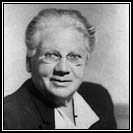 Alexandra
Tolstoy Alexandra
Tolstoy
Born in Russia at Yasnaya Polyana in 1884, Alexandra Tolstoy, the youngest daughter of Leo Tolstoy, was permitted to leave Soviet Russia in 1929 after five arrests and a prison sentence for supporting the right of free speech and assembly. She settled in the United States in 1931 where she engaged in farming and lectured widely in schools, universities and clubs. She made friends easily and learned to love and admire the United States.
In l941, Eleanor Roosevelt wrote the following words describing her first meeting with Alexandra Tolstoy: "Countess Tolstoy came to see me at my apartment in New York City. She is no longer very young, but she climbed the three flights of stairs with less puffing than most of us. Her interest in her mission was so great that I think she scarcely gave a thought to her own exertions...Countess Tolstoy, by her own enthusiasm and devotion inspires you greatly with a desire to be helpful to this group of harassed human beings."
Alexandra Tolstoy was a consistent beacon of light to the aged, to the young, to the sick, to the distressed and to the forgotten at home and abroad. It was said of her that "no one came to her despondent without solace. No one came in despair without receiving encouragement."
In 1939, Alexandra Tolstoy founded the Tolstoy Foundation. Among the original founders and sponsors were Igor Sikorsky, Serge Rachmaninoff,
Tatiana Schaufuss, former Russian Ambassador Boris Bakhmeteff and WWI flying ace Captain Boris Sergievsky. Former President Herbert Hoover became the first Honorary Chairman in l939 and served in this capacity until his death in l964.
As President of the Tolstoy Foundation for 40 years, A.
Tolstoy worked to build public support for international refugee relief efforts and to effect changes in U.S. immigration laws. In 1948, she testified before the House Judiciary Committee on behalf of the Displaced Persons Act and was instrumental in its passage.
A pioneer of international refugee relief efforts, Alexandra
Tolstoy was a passionate early advocate of human rights. She spoke and wrote eloquently against all forms of human rights abuses and in defense of dissidents and other persecuted individuals. Her abhorrence of all forms of tyranny and injustice; her staunch determination to defend the rights of the victims of oppression and her famous name opened doors for her to presidents, statesmen and politicians alike. She strongly believed that freedom is not political, it is a Divine Right. Aiding persons to attain freedom is a moral duty and a high privilege.
Under her leadership, the Foundation became a genuine Bridge of Hope, assisting more than 500,000 people to escape the horrors of war and political persecution and to build a new life in America as free men and women. Her greatest concern was that new immigrants assimilate quickly and successfully into the mainstream of American life, without losing their cultural and spiritual identities.
In 1941, a generous private donor made it possible for the Tolstoy Foundation to acquire Reed Farm, a 70-acre parcel of land 36 miles north of New York City. As Alexandra
Tolstoy envisioned, the Farm became a haven and a resettlement center for over 30,000 refugees brought to the United States and directly sponsored by the Foundation. Here, if necessary, the elderly could spend their remaining years with proper care, and the children could begin to reclaim their childhood.
All ages, backgrounds and professions were represented among the new residents, and all of those who could, contributed to the operation of the Farm. Alexandra
Tolstoy was a firm believer in training and work programs to help new immigrants adapt to life in their adopted country and to become self-sufficient and productive citizens. This occupational therapy proved to be extremely beneficial to the people just freed from the horrors of a devastated Europe. Here they could develop some psychological equilibrium, learn English and the skills necessary to start their new life in America. Here they could restore their dignity with work. Alexandra
Tolstoy's mission of respect for human dignity, while building self-reliance through education and practical training, had begun.
Cultural activities were organized and a summer camp, active until 1968, was established for needy children. The Farm became the TF Center and remains the very heart of the Foundation to this day.
Energetic all her life, with a remarkable calmness of spirit, Alexandra
Tolstoy lived at the TF Center in Valley Cottage, New York. She was active as the Foundation's President and served as a fundraiser, a lecturer, and a writer until l976. She died in 1979 at age 96.
 |